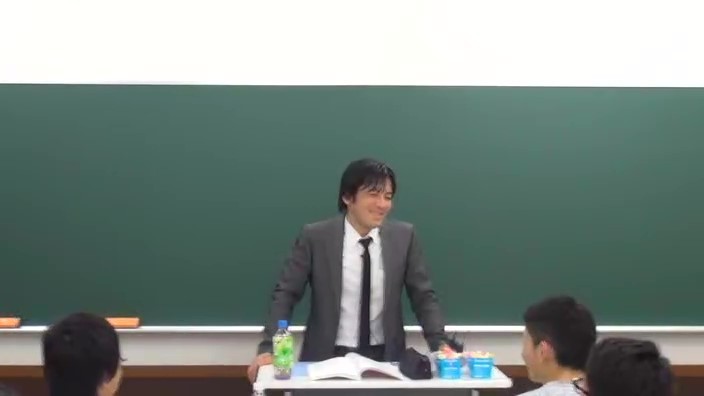【 how 】で成る諺 &【wh- 】で成る名言の理由を考える。
父:君の年ごろは、私たちはもっと勉強したものだよ。
子:昔はそうだったんですね。
Father: We worked a lot harder when we were your age.
Son: 【 the / that / to / case / used / be 】 a long time ago.
<used to do >
⑴〔過去の習慣〕「 ~ したものだった」
⑵〔過去の継続的状態〕「以前は ~ だった」
正解:That used to be the case a long time ago.
In the distant past, that was the norm.
Long ago, that was the prevailing situation.
Back in the day, it was like that.
There was a time when things were that way.
<参考>
used toとwouldは次の3点で使い分ける
☆ used to : 規則的習慣,状態/ would : 不規則な習慣
☆ used to+意志動詞・無意志動詞/ would+意志動詞
☆ 現在との対比ではused toのみを用いる
I used to go to the movies every Sunday but now I don’t.
(日曜日には映画を見に行ったものだったが,今は行かない)
I would often go to the movies when I was young.
(若いころはよく映画を見に行ったものだ)
あんな寒い夜に彼女を待たせておくべきではなかった。
You【 kept / a / have / her / not / such / to / on / ought / waiting / cold 】night.
<ought not to have done >
「すべきだったのに」(実際はした)(=should not have done)
<ought to>
☆ 否定形:<S ought not (to) do ~>
☆ 疑問文:<Ought S (to) do ~ ? >
ought not to have kept(V) her(O) waiting(C)
such a cold night = so cold a night の語順に注意。
正解:You ought not to have kept her waiting on such a cold night.
It wasn't necessary for you to keep her waiting in such cold weather.
You shouldn't have kept her waiting in that cold night.
There was no need for you to have made her wait in such a cold evening.
私は, 君が急ぐ必要がないことに後で気が付いた。
【 didn’t / you / hurry / that / found afterwards / to / I / need 】.
<didn’t need to>「 ~ する必要はなかった」
実際にしたかどうかは文脈による。
ここでの need は本動詞。
正解:I found afterwards that you didn’t need to hurry.
I later discovered that you didn’t need to rush.
Afterward, I realized that there was no hurry required.
Afterward, I found out there was no need for you to hurry.
Later on, it became clear that you didn't have to rush.
大学生ともあろうものがそんなことを知らないとは不思議だ。
It is strange that a college student【 ignorant / the / be / fact / should / of 】.
形式主語構文<It is … that ~>の補語に
「驚き」や「遺憾」などの語が来て
that 節内が should do まは原形になる構文。
<be ignorant of ~>「~ を知らない」
正解:It is strange that a college student should be ignorant of the fact.
It's peculiar that a college student is ignorant of that fact.
How strange that a university student lacks knowledge of that fact.
It's odd for a college student not to know that.
It's surprising that a student from college doesn't have awareness of that.
彼女が娘自慢なのももっともだ。
【 proud / well / she / her daughter / be / may / of 】.
<may well >「 ~ するのももっともだ」
( may「許可」+ well「十分」〈強意〉
問題文を書き換えると,
She has every reason to take pride in her daughter.
It is natural that she (should) pride herself on her daughter.
No wonder she boasts about[in] her daughter.
<may well >には「おそらく ~ だろう」の意もある。
It may well rain tonight.
「たぶん今晩雨だろう」
正解:She may well be proud of her daughter.
She may take pride in her daughter.
It's quite possible for her to be proud of her daughter.
It's reasonable for her to feel proud of her daughter.
She has every reason to be proud of her daughter.
may
:used to ask or give permission
〈許可〉 ▸ 推し量りを許す ▸ 〈可能性・推量〉
❶〔許可〕「 ~ してもよい」
May I take a picture?
― Yes, you may.
No, you may not.
No, you must not.
(写真を撮ってもいいですか)
❷〔推量〕「 ~ かもしれない」
Diana may be an honest girl.
(ダイアナは正直な女の子かもしれない)
❸ <may well ~>「 ~ するのももっともだ」
You may well get angry.
(あなたが怒るのももっともだ)
❹ <may as well ~>「 ~ したほうがいい」
You may as well see a dentist.
(歯医者に診てもらったほうがいいだろう)
❺ <might as well ~ as …>「…するくらいなら ~ したほうがましだ」
You might as well give up the project as do it incompletely.
(中途半端なくらいなら,その計画はやめてしまったほうがましだ)
彼女は答えの見当がつかなかったが、どうしてもあきらめなかった。
She did not【give / but / she / the answer / guess / would / up / not】.
〈拒絶〉の <would not >
「どうしても ~ しようとしなかった」
guess「推測する」
正解:She did not guess the answer but she would not give up.
She couldn't guess the answer but persisted nonetheless.
Despite not guessing the answer, she refused to give up.
While she couldn't guess the answer, she was determined not to quit.
She persisted even though she couldn't figure out the answer.
教室を整頓するように命じられた。
It was【the classroom / put / ordered / order / be / in / that】.
<It is ordered that S (should) do >
「 ~ するように命じられる」
that 節内の動詞表現は時制の一致を受けない。
put in order「整頓する」
正解:It was ordered that the classroom be put in order.
An order was given to tidy up the classroom.
It was mandated that the classroom be put in order.
The classroom was ordered to be organized.
There was an instruction to organize the classroom.
その仕事はあとに延ばすより今したほうがいい。<1語句不要>
You【as / do / should / may as well / put it off / the task now】.
<may as well ~ (as not) …>
「…するくらいなら ~ のほうがましだ」
(=would rather ~ than ...)
ex.) I might[may]well die as do it.
= I would rather die than do it.
(それをするくらいなら,死ぬほうがましだ)
You might[may]as well throw your money away as lend it to him.
(彼に金を貸すくらいなら投げ捨てたほうがましだ)
put off A 「Aを延期する」(=postpone A )
Aが代名詞(旧情報)なので
口調の関係からも putの後ろに置かれる。
shouldは不要.
正解:You may as well do the task now as put it off.
You might as well complete the task now rather than put it off.
Doing the task now is just as good as postponing it.
You may as well do the task now instead of delaying it.
It's equally beneficial to do the task immediately rather than procrastinate.
<参考>
〈動詞+副詞〉の語順:
◎ Tom took off her hat.
◎ Tom took her hat off.
◎ Tom took it off.
× Tom took off it.
これを公式化すると,
〔動詞+副詞〕が一つの他動詞の意味を表す場合,次の語順で用いる
[Ⅰ]O=名詞 ➪〔動詞+O+副詞〕or〔動詞+副詞+O〕
[Ⅱ]O=代名詞 ➪〔動詞+O+副詞〕
次のような群動詞にこの公式が適用される.
・take off(~を脱ぐ)
・put off(~を延期する)
・put on(~を着る)
・give up(~をあきらめる)
・carry out(~を実行する)
自由はすぐれて根元的なものであるからその重要性はいくら強調してもしすぎることはない。<1語不要>
Freedom is so basic【we / can / too / its / that / cannot / emphasize / importance】much.
<cannot … to ~>「どんなに~しても…しすぎることはない」
can は不要.
that 節内の内容を書き換えると,
We cannot overemphasize its importance.
It is impossible to emphasize its importance enough.
正解:Freedom is so basic that we cannot emphasize its importance too much.
The importance of freedom cannot be emphasized too much.
We cannot stress enough how fundamental freedom is.
Freedom is so crucial that we can't emphasize its importance too much.
Its importance is so vital that no amount of emphasis is excessive.
あんなやつに金を払わなくてもよかったのに。<1語句不要>
【 didn’t need / need / him / you / have / paid / not 】.
助動詞としてのneedは疑問文または否定文で用いる。
☆ <Need S do … ? >
☆ <S need not [needn’t] do … >
didn't need は不要。
正解:You need not have paid him.
You didn't have to make the payment to him.
It wasn't necessary for you to have given him the payment.
There was no requirement for you to have paid him.
You were not obligated to make the payment to him.
It wasn't needed for you to have given him payment.
There was no necessity for you to have paid him.
You could have refrained from paying him.
There was the option not to have given him the payment.
<参考>
助動詞には否定形と疑問形の形が注意を要するものがある。
☆ have to do ➪ Does he have to do ~ ?
He doesn’t have to do ~ .
☆ used to do ➪ Did he use to do ~ ?
Used he to do ~ ?
He didn’t use to do ~.
He used not (to) do ~ .
☆ ought to do ➪ Ought he (to) do ~ ?
He ought not (to) do ~ .
☆ need〔動 詞〕➪ Does he need to do ~ ?
He doesn’t nee to do ~ .
〔助動詞〕➪ Need he do ~?
He need not do ~ .
音読基本英文
That used to be the case a long time ago.
In the distant past, that was the norm.
Long ago, that was the prevailing situation.
Back in the day, it was like that.
There was a time when things were that way.
You ought not to have kept her waiting on such a cold night.
It wasn't necessary for you to keep her waiting in such cold weather.
You shouldn't have kept her waiting in that cold night.
There was no need for you to have made her wait in such a cold evening.
I found afterwards that you didn’t need to hurry.
I later discovered that you didn’t need to rush.
Afterward, I realized that there was no hurry required.
Afterward, I found out there was no need for you to hurry.
Later on, it became clear that you didn't have to rush.
It is strange that a college student should be ignorant of the fact.
It's peculiar that a college student is ignorant of that fact.
How strange that a university student lacks knowledge of that fact.
It's odd for a college student not to know that.
It's surprising that a student from college doesn't have awareness of that.
She may well be proud of her daughter.
She may take pride in her daughter.
It's quite possible for her to be proud of her daughter.
It's reasonable for her to feel proud of her daughter.
She has every reason to be proud of her daughter.
She did not guess the answer but she would not give up.
She couldn't guess the answer but persisted nonetheless.
Despite not guessing the answer, she refused to give up.
While she couldn't guess the answer, she was determined not to quit.
She persisted even though she couldn't figure out the answer.
It was ordered that the classroom be put in order.
An order was given to tidy up the classroom.
It was mandated that the classroom be put in order.
The classroom was ordered to be organized.
There was an instruction to organize the classroom.
You may as well do the task now as put it off.
You might as well complete the task now rather than put it off.
Doing the task now is just as good as postponing it.
You may as well do the task now instead of delaying it.
It's equally beneficial to do the task immediately rather than procrastinate.
Freedom is so basic that we cannot emphasize its importance too much.
The importance of freedom cannot be emphasized too much.
We cannot stress enough how fundamental freedom is.
Freedom is so crucial that we can't emphasize its importance too much.
Its importance is so vital that no amount of emphasis is excessive.
You need not have paid him.
You didn't have to make the payment to him.
It wasn't necessary for you to have given him the payment.
There was no requirement for you to have paid him.
You were not obligated to make the payment to him.
It wasn't needed for you to have given him payment.
There was no necessity for you to have paid him.
You could have refrained from paying him.
There was the option not to have given him the payment.
今後も英語学習に関わる情報、体験談を発信していきます。










